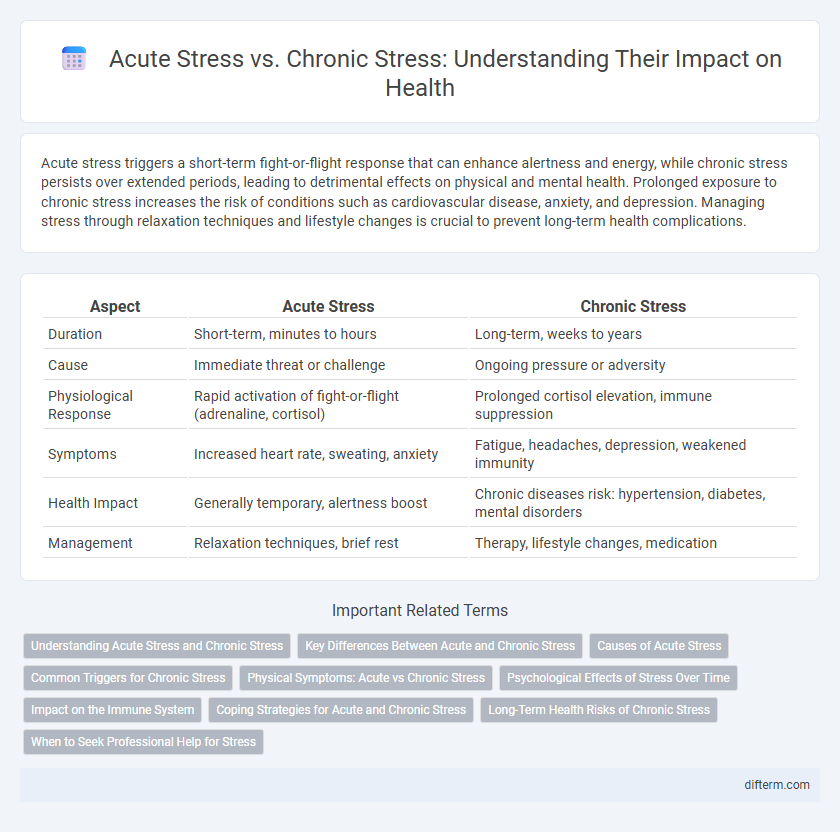Acute stress triggers a short-term fight-or-flight response that can enhance alertness and energy, while chronic stress persists over extended periods, leading to detrimental effects on physical and mental health. Prolonged exposure to chronic stress increases the risk of conditions such as cardiovascular disease, anxiety, and depression. Managing stress through relaxation techniques and lifestyle changes is crucial to prevent long-term health complications.
Table of Comparison
| Aspect | Acute Stress | Chronic Stress |
|---|---|---|
| Duration | Short-term, minutes to hours | Long-term, weeks to years |
| Cause | Immediate threat or challenge | Ongoing pressure or adversity |
| Physiological Response | Rapid activation of fight-or-flight (adrenaline, cortisol) | Prolonged cortisol elevation, immune suppression |
| Symptoms | Increased heart rate, sweating, anxiety | Fatigue, headaches, depression, weakened immunity |
| Health Impact | Generally temporary, alertness boost | Chronic diseases risk: hypertension, diabetes, mental disorders |
| Management | Relaxation techniques, brief rest | Therapy, lifestyle changes, medication |
Understanding Acute Stress and Chronic Stress
Acute stress is the body's immediate, short-term response to a perceived threat or challenge, often triggering the "fight or flight" reaction with symptoms like increased heart rate and heightened alertness. Chronic stress, in contrast, involves prolonged exposure to stressors, leading to persistent activation of the stress response system, which can result in health issues such as cardiovascular disease, anxiety, and weakened immune function. Understanding the distinct physiological effects and health risks associated with acute and chronic stress is crucial for effective stress management and prevention strategies.
Key Differences Between Acute and Chronic Stress
Acute stress is a short-term response triggered by immediate threats or challenges, often resolving quickly once the situation is managed. Chronic stress persists over an extended period, resulting from ongoing pressures such as work demands, financial problems, or relationship issues, leading to prolonged activation of the body's stress response system. The key differences between acute and chronic stress lie in their duration, physiological impact, and potential health consequences, with chronic stress significantly increasing risks for heart disease, depression, and weakened immune function.
Causes of Acute Stress
Acute stress is primarily triggered by immediate, short-term events or situations such as sudden work deadlines, an unexpected argument, or a near accident. This type of stress activates the body's fight-or-flight response through the release of adrenaline and cortisol from the adrenal glands. Unlike chronic stress, acute stress arises from specific external stressors and typically resolves once the event passes.
Common Triggers for Chronic Stress
Common triggers for chronic stress include ongoing financial difficulties, persistent work-related pressure, and unresolved relationship conflicts. Chronic illness, caregiving responsibilities, and continuous exposure to unsafe environments also significantly contribute to prolonged stress. These factors disrupt the body's ability to return to baseline, leading to lasting physiological and psychological effects.
Physical Symptoms: Acute vs Chronic Stress
Acute stress triggers immediate physical symptoms such as increased heart rate, muscle tension, and rapid breathing, preparing the body for a short-term "fight or flight" response. Chronic stress leads to prolonged physical effects including hypertension, weakened immune function, persistent fatigue, and gastrointestinal issues due to sustained cortisol elevation. Distinguishing between these stress types is crucial for targeted interventions and maintaining long-term health.
Psychological Effects of Stress Over Time
Acute stress triggers a temporary surge in adrenaline and cortisol, resulting in heightened alertness and short-term emotional responses like anxiety or irritability. Chronic stress leads to prolonged elevation of stress hormones, causing persistent psychological effects such as depression, memory impairment, and increased risk of anxiety disorders. Over time, chronic stress disrupts neural circuits in the brain's hippocampus and prefrontal cortex, impairing emotional regulation and cognitive function.
Impact on the Immune System
Acute stress triggers a temporary boost in immune response by activating the body's fight-or-flight mechanism, leading to increased production of immune cells and inflammatory responses. Chronic stress, however, suppresses immune function through prolonged elevation of cortisol levels, reducing lymphocyte activity and lowering resistance to infections. This persistent immune suppression increases vulnerability to illnesses and slows down the body's ability to heal.
Coping Strategies for Acute and Chronic Stress
Effective coping strategies for acute stress include deep breathing exercises, mindfulness meditation, and temporary removal from the stressor to restore calm. Chronic stress requires long-term management approaches such as regular physical activity, cognitive-behavioral therapy, and consistent social support to reduce physiological and psychological effects. Implementing tailored stress reduction techniques enhances resilience and promotes overall mental health in both acute and chronic stress conditions.
Long-Term Health Risks of Chronic Stress
Chronic stress elevates cortisol levels persistently, leading to increased risks of cardiovascular disease, hypertension, and type 2 diabetes. Prolonged exposure to stress hormones also impairs immune function, contributing to higher susceptibility to infections and slower wound healing. Mental health disorders such as depression and anxiety are strongly associated with long-term chronic stress, exacerbating overall health decline.
When to Seek Professional Help for Stress
Seek professional help for stress when symptoms persist beyond several weeks, interfere with daily activities, or cause physical health issues such as headaches, digestive problems, or sleep disturbances. Acute stress typically resolves quickly, but chronic stress requires intervention to prevent long-term effects like hypertension, anxiety, or depression. Early consultation with a healthcare provider or mental health professional can provide effective coping strategies and prevent progression to more severe conditions.
Acute stress vs Chronic stress Infographic

 difterm.com
difterm.com